Module 2 Experiences Unit 3 Grammar 课件(共18张PPT) 外研版八年级下册
文档属性
| 名称 | Module 2 Experiences Unit 3 Grammar 课件(共18张PPT) 外研版八年级下册 | 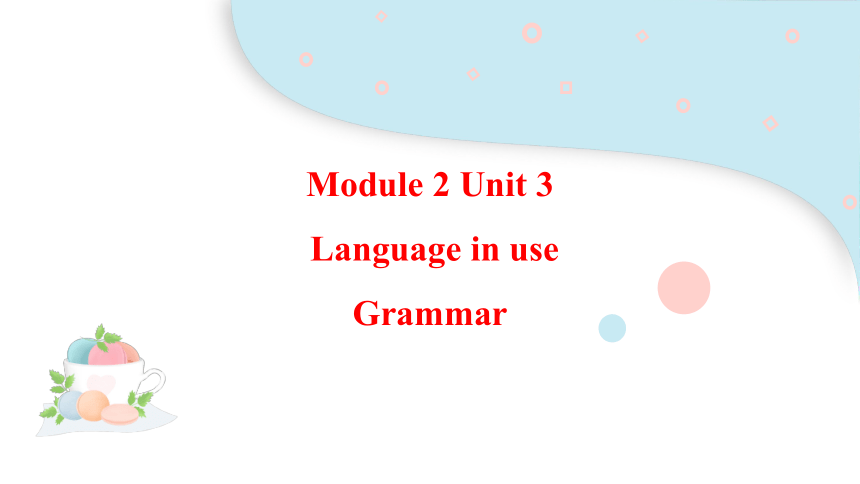 | |
| 格式 | pptx | ||
| 文件大小 | 2.2MB | ||
| 资源类型 | 教案 | ||
| 版本资源 | 外研版 | ||
| 科目 | 英语 | ||
| 更新时间 | 2024-11-23 15:58:49 | ||
图片预览


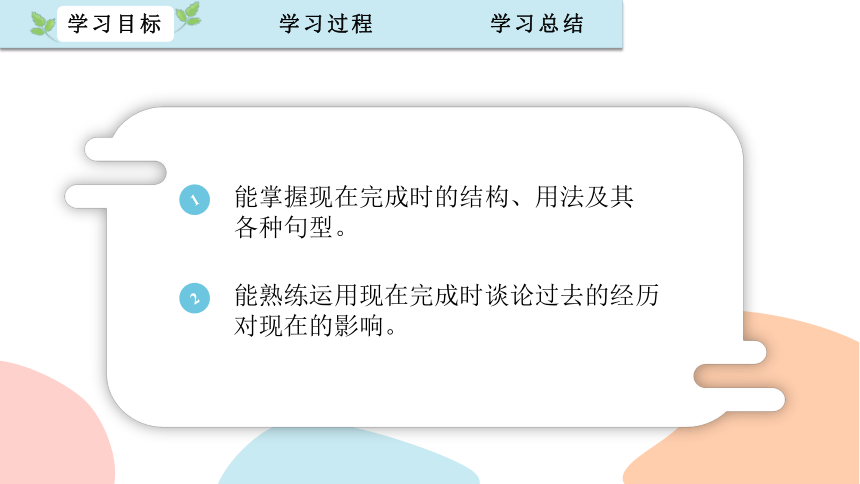
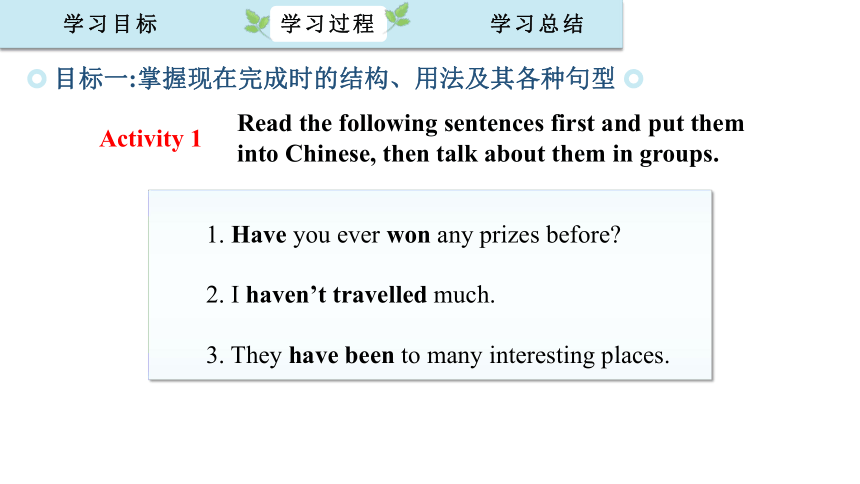

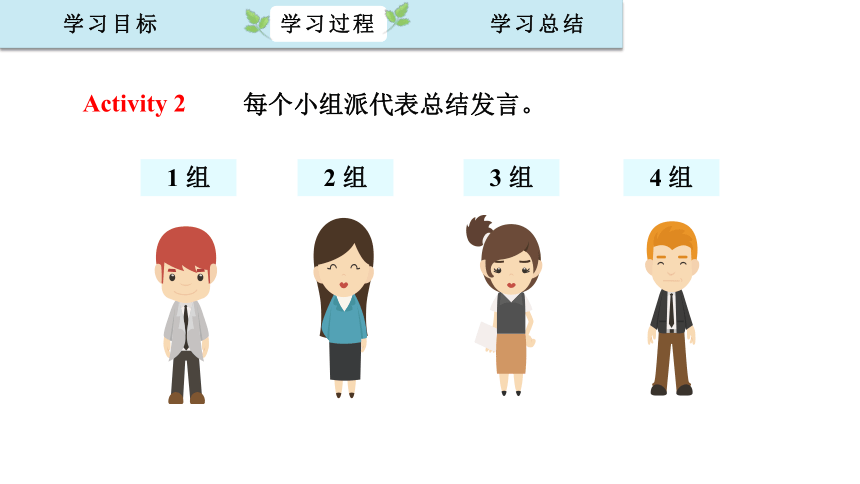
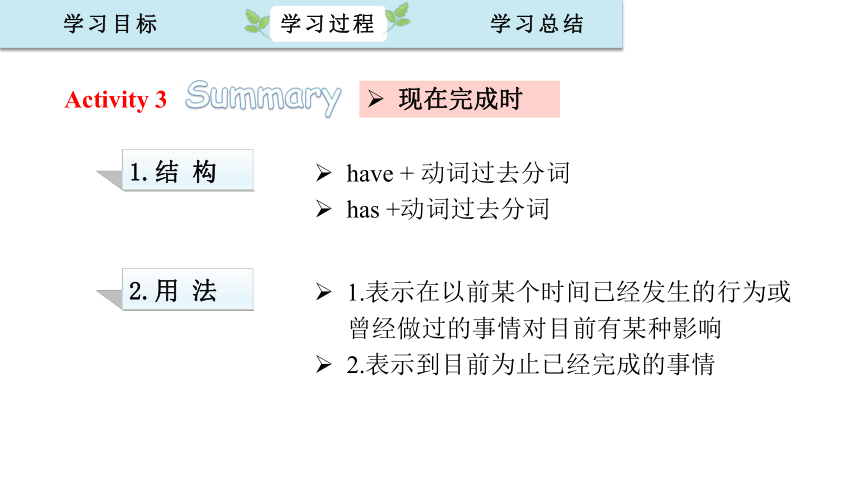
文档简介
(共18张PPT)
Module 2 Unit 3
Language in use
Grammar
Free Talk
A: Have you ever been to…
B: Yes, I have. / No, I haven’t.
现在完成时
( the present perfect )
1
2
能掌握现在完成时的结构、用法及其
各种句型。
能熟练运用现在完成时谈论过去的经历对现在的影响。
目标一:掌握现在完成时的结构、用法及其各种句型
Activity 1
Read the following sentences first and put them
into Chinese, then talk about them in groups.
1. Have you ever won any prizes before
2. I haven’t travelled much.
3. They have been to many interesting places.
Group
Discussion
小组合作观察每个句子,讨论、总结并分组展示。
Task 1: 观察句子的谓语,根据其特点总结现在完成时的
结构并思考其用法;
Task 2: 观察并推导出现在完成时的各种句型, 并查阅相关
资料总结, 当主语(人称)发生变化时句型如何变化;
Task 3: 观察并尝试总结动词过去分词的变化规则。
1. Have you ever won any prizes before
2. I haven’t travelled much.
3. They have been to many interesting places.
Activity 2
每个小组派代表总结发言。
1 组
2 组
3 组
4 组
Activity 3
Summary
现在完成时
1.表示在以前某个时间已经发生的行为或曾经做过的事情对目前有某种影响
2.表示到目前为止已经完成的事情
1.结 构
2.用 法
have + 动词过去分词
has +动词过去分词
3.句 型
①肯定句:
Have/Has+主语+动词的过去分词(p.p)(V-ed)+宾语
肯定回答: Yes, 主语+ have/has.
否定回答: No, 主语+ haven't/hasn't.
②否定句:
③一般疑问句:
主语+have/has+动词的过去分词(p.p)(V-ed).
主语+have/has not (haven't/hasn't) +动词的过去分词(p.p)(V-ed).
主语为第一、二、三人称
及其复数时?
人称 肯定句 否定句 疑问句及回答
第一人称 I have seen the questionnaire in this newspaper I have not (haven't) seen the questionnaire in this newspaper. Have you seen the questionnaire
in this newspaper
Yes, I have./No, I have not (haven't).
We have travelled around the world. We have not(haven't) travelled around the world. Have you travelled around the world
Yes. we have./No, we have not (haven't).
第二人称 You have been to England. You have not(haven't) been to England. Have you been to England
Yes, I/we have.
No. I/we have not (haven't).
第三人称 He/She has been to Disneyland in Los Angeles. He/She has not (hasn't) been to Disneyland in Los Angeles. Has he/she been to Disneyland in Los Angeles
Yes, he/she has.
No. he/she has not (hasn't).
They have given concerts all over the world. They have not (haven't) given concerts all over the world. Have they given concerts all over the world
Yes, they have./No, they have not (haven't)
4.动词过去分词的变化规则
规则动词的过去分词的构成规则与规则动词的过去式的构成规则相同。
(1) 一般动词,在词尾直接加"-ed "。e.g. work — worked
(2) 以不发音的"e"结尾的动词,只在词尾加"-d "。e.g. live — lived
(3) 以"辅音字母+ y "结尾的动词,将"y"变为"i",再加"-ed"。
e.g. study — studied, cry — cried
(4) "重读闭音节"结尾,且末尾只有一个辅音字母(w、y、x除外),
辅音字母前只有一个元音字母,先双写该辅音字母,再加"-ed"。
e.g. stop — stopped, plan — planned
4.动词过去分词的变化规则
不规则动词的过去分词,其变化形式需谨记。例如:
be — was / were — been find — found — found
do — did — done have — had — had
eat — ate — eaten make — made — made
go — went — gone let — let — let
see — saw— seen put — put — put
详见课本P126~129
目标二:熟练运用现在完成时谈论过去的经历对现在的影响
Activity 1
Look at the pictures and ask questions with
Have you ever ...
1) have a Western meal
Have you ever had a Western meal
Free Talk
2) live in another city
3) enter a singing competition
Have you ever lived in another city
Have you ever entered a singing competition
4) travel by train
Have you ever travelled by train
5) travel to the seaside
Have you ever travelled to the seaside
6) try seafood
Have you ever tried seafood
7) cook dinner for your parents
Have you ever cooked dinner for your parents
1
Now complete the You column.
Activities You Your partner
1 Have you ever had a Western meal
2 Have you ever lived in another city
3 Have you ever entered a singing competition
4 Have you ever travelled by train
5 Have you ever travelled to the seaside
6 Have you ever tried seafood
7 Have you ever cooked dinner for your parents
2
Work in pairs. Ask and answer the questions in the questionnaire below. Then complete the Your partner column.
—Have you ever had
a Western meal
—Yes, I have. / No, I haven’t.
3
Complete the sentences about your partner
and read them to the rest of the class.
1) He/She ____________________ a Western meal.
2) He/She _____________________ in another city.
3) He/She ______________________ a singing competition.
4) He/She _______________________ by train.
5) He/She _______________________ to the seaside.
6) He/She ___________________ seafood.
7) He/She __________________________ for his/her parents.
has/has not ever entered
has/has not ever lived
has/has not ever had
has/has not ever travelled
has/has not ever tried
has/has not ever cooked dinner
has/has not ever travelled
Activity 2
4
Complete the postcard. Use the list of Things to do in Beijing to help you.
see the Beijing Opera √
climb the Great Wall ×
eat Beijing duck √
visit the Palace Museum √
Dear David,
I am having a wonderful time in Beijing. I’ve
done so many things! I’ve ______________
___________________________________
___________________________________
There’s only one thing I haven’t done :
I ____________________________
Bye for now,
Rob
see the Beijing Opera √
climb the Great Wall ×
eat Beijing duck √
visit the Palace Museum √
seen the Beijing
Opera. I've eaten Beijing duck. I've visited
the Palace Museum.
haven't climbed the Great Wall.
综合上述目标,说说我们今天的收获。
学习目标
1
2
能掌握现在完成时的构成、用法及其
各种句型。
能熟练运用现在完成时谈论过去的
经历对现在的影响。
Module 2 Unit 3
Language in use
Grammar
Free Talk
A: Have you ever been to…
B: Yes, I have. / No, I haven’t.
现在完成时
( the present perfect )
1
2
能掌握现在完成时的结构、用法及其
各种句型。
能熟练运用现在完成时谈论过去的经历对现在的影响。
目标一:掌握现在完成时的结构、用法及其各种句型
Activity 1
Read the following sentences first and put them
into Chinese, then talk about them in groups.
1. Have you ever won any prizes before
2. I haven’t travelled much.
3. They have been to many interesting places.
Group
Discussion
小组合作观察每个句子,讨论、总结并分组展示。
Task 1: 观察句子的谓语,根据其特点总结现在完成时的
结构并思考其用法;
Task 2: 观察并推导出现在完成时的各种句型, 并查阅相关
资料总结, 当主语(人称)发生变化时句型如何变化;
Task 3: 观察并尝试总结动词过去分词的变化规则。
1. Have you ever won any prizes before
2. I haven’t travelled much.
3. They have been to many interesting places.
Activity 2
每个小组派代表总结发言。
1 组
2 组
3 组
4 组
Activity 3
Summary
现在完成时
1.表示在以前某个时间已经发生的行为或曾经做过的事情对目前有某种影响
2.表示到目前为止已经完成的事情
1.结 构
2.用 法
have + 动词过去分词
has +动词过去分词
3.句 型
①肯定句:
Have/Has+主语+动词的过去分词(p.p)(V-ed)+宾语
肯定回答: Yes, 主语+ have/has.
否定回答: No, 主语+ haven't/hasn't.
②否定句:
③一般疑问句:
主语+have/has+动词的过去分词(p.p)(V-ed).
主语+have/has not (haven't/hasn't) +动词的过去分词(p.p)(V-ed).
主语为第一、二、三人称
及其复数时?
人称 肯定句 否定句 疑问句及回答
第一人称 I have seen the questionnaire in this newspaper I have not (haven't) seen the questionnaire in this newspaper. Have you seen the questionnaire
in this newspaper
Yes, I have./No, I have not (haven't).
We have travelled around the world. We have not(haven't) travelled around the world. Have you travelled around the world
Yes. we have./No, we have not (haven't).
第二人称 You have been to England. You have not(haven't) been to England. Have you been to England
Yes, I/we have.
No. I/we have not (haven't).
第三人称 He/She has been to Disneyland in Los Angeles. He/She has not (hasn't) been to Disneyland in Los Angeles. Has he/she been to Disneyland in Los Angeles
Yes, he/she has.
No. he/she has not (hasn't).
They have given concerts all over the world. They have not (haven't) given concerts all over the world. Have they given concerts all over the world
Yes, they have./No, they have not (haven't)
4.动词过去分词的变化规则
规则动词的过去分词的构成规则与规则动词的过去式的构成规则相同。
(1) 一般动词,在词尾直接加"-ed "。e.g. work — worked
(2) 以不发音的"e"结尾的动词,只在词尾加"-d "。e.g. live — lived
(3) 以"辅音字母+ y "结尾的动词,将"y"变为"i",再加"-ed"。
e.g. study — studied, cry — cried
(4) "重读闭音节"结尾,且末尾只有一个辅音字母(w、y、x除外),
辅音字母前只有一个元音字母,先双写该辅音字母,再加"-ed"。
e.g. stop — stopped, plan — planned
4.动词过去分词的变化规则
不规则动词的过去分词,其变化形式需谨记。例如:
be — was / were — been find — found — found
do — did — done have — had — had
eat — ate — eaten make — made — made
go — went — gone let — let — let
see — saw— seen put — put — put
详见课本P126~129
目标二:熟练运用现在完成时谈论过去的经历对现在的影响
Activity 1
Look at the pictures and ask questions with
Have you ever ...
1) have a Western meal
Have you ever had a Western meal
Free Talk
2) live in another city
3) enter a singing competition
Have you ever lived in another city
Have you ever entered a singing competition
4) travel by train
Have you ever travelled by train
5) travel to the seaside
Have you ever travelled to the seaside
6) try seafood
Have you ever tried seafood
7) cook dinner for your parents
Have you ever cooked dinner for your parents
1
Now complete the You column.
Activities You Your partner
1 Have you ever had a Western meal
2 Have you ever lived in another city
3 Have you ever entered a singing competition
4 Have you ever travelled by train
5 Have you ever travelled to the seaside
6 Have you ever tried seafood
7 Have you ever cooked dinner for your parents
2
Work in pairs. Ask and answer the questions in the questionnaire below. Then complete the Your partner column.
—Have you ever had
a Western meal
—Yes, I have. / No, I haven’t.
3
Complete the sentences about your partner
and read them to the rest of the class.
1) He/She ____________________ a Western meal.
2) He/She _____________________ in another city.
3) He/She ______________________ a singing competition.
4) He/She _______________________ by train.
5) He/She _______________________ to the seaside.
6) He/She ___________________ seafood.
7) He/She __________________________ for his/her parents.
has/has not ever entered
has/has not ever lived
has/has not ever had
has/has not ever travelled
has/has not ever tried
has/has not ever cooked dinner
has/has not ever travelled
Activity 2
4
Complete the postcard. Use the list of Things to do in Beijing to help you.
see the Beijing Opera √
climb the Great Wall ×
eat Beijing duck √
visit the Palace Museum √
Dear David,
I am having a wonderful time in Beijing. I’ve
done so many things! I’ve ______________
___________________________________
___________________________________
There’s only one thing I haven’t done :
I ____________________________
Bye for now,
Rob
see the Beijing Opera √
climb the Great Wall ×
eat Beijing duck √
visit the Palace Museum √
seen the Beijing
Opera. I've eaten Beijing duck. I've visited
the Palace Museum.
haven't climbed the Great Wall.
综合上述目标,说说我们今天的收获。
学习目标
1
2
能掌握现在完成时的构成、用法及其
各种句型。
能熟练运用现在完成时谈论过去的
经历对现在的影响。
同课章节目录
- Module 1 Feelings and impressions
- Unit 1 It smells delicious.
- Unit 2 I feel nervous when I speak Chinese .
- Unit 3 Language in use
- Module 2 Experiences
- Unit 1 I've also entered lots of speaking competi
- Unit 2 They have seen the Pyramids.
- Unit 3 Language in use
- Module 3 Journey to space
- Unit 1 Has it arrived yet?
- Unit 2 We have not found life on any other planet
- Unit 3 Language in use
- Module 4 Seeing the docto
- Unit 1 I haven't done much exercise since I got m
- Unit 2 We have played football for a year now
- Unit 3 Language in use
- Module 5 Cartoons
- Unit 1 It's time to watch a cartoon.
- Unit 2 Tintin has been popular for over eighty yea
- Unit 3 Language in use
- Revision module A
- Module 6 Hobbies
- Unit 1 Do you collect anything ?
- Unit 2 Hobbies can make you grow as a person.
- Unit 3 Language in use
- Module 7 Summer in Los Angeles
- Unit 1 Please write to me and send me some photos
- Unit 2 Fill out a form and come to learn English
- Unit 3 Language in use
- Module 8 Time off
- Unit 1 I can hardly believe we are in the city ce
- Unit 2 We thought somebody was moving about
- Unit 3 Language in use
- Module 9 Friendship
- Unit 1 Could I ask if you've mentioned this to he
- Unit 2 I believe that the world is what you think
- Unit 3 Language in use
- Module 10 On the radio
- Unit 1 I hope that you can join us one day
- Unit 2 It seemed that they were speaking to me in
- Unit 3 Language in use
- Revision module B
